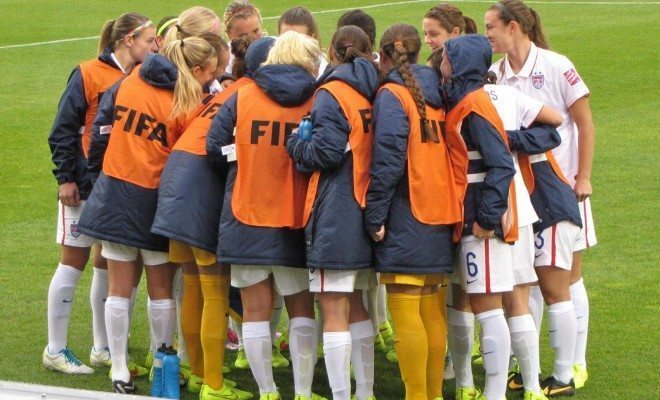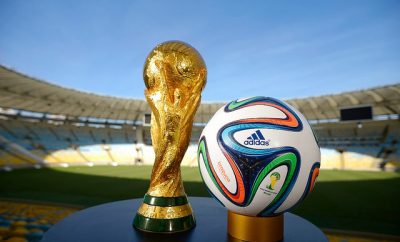 "North Korea vs USA, U-20 Women's World Cup - USWNT huddle" courtesy of [Andrea Williams via Flickr]
"North Korea vs USA, U-20 Women's World Cup - USWNT huddle" courtesy of [Andrea Williams via Flickr]
News
Top Stars on U.S. Women’s Soccer Step Up Their Fight For Wage Equality
Despite shining a light on a country that hasn’t traditionally been well-known for its soccer performance on the world stage, the players on the U.S. women’s national soccer team still aren’t receiving the recognition they deserve. The Women’s World Cup and Olympic Gold Medal champs have been a source of pride for the U.S. Soccer Federation, but now the team’s top players are bringing attention to the fact that they’re still being paid less than their male counterparts, despite outperforming them.
Five of the team’s top players: goalkeeper Hope Solo, forward Alex Morgan, midfielder Megan Rapinoe, and co-captains Carli Lloyd and Becki Sauerbrunn, filed a federal complaint on Thursday with the Equal Employment Opportunity Commission (EEOC) against the U.S. Soccer Federation, alleging wage discrimination.
In the complaint, the players point out that the Women’s National Team is projected to bring in a net profit of $5 million for U.S. Soccer while the Men’s National Team is actually projected to bring a net loss of $1 million. Meanwhile, they receive less compensation for Friendlies, the World Cup, and sponsored appearances compared to the men’s team. The complaint alleges:
There are no legitimate, non-discriminatory reasons for this gross disparity of wages, nor can it be explained away by any bona fide seniority, merit or incentive system or any other factor other than sex.
In an interview with ESPN, the teammates spoke up on the filing, saying that they resorted to legal action after having several conversations with U.S. Soccer that were ineffective. They also said that while only the five of them were listed on the complaint, they were representing the entire women’s team in their fight.
U.S. Soccer responded Thursday, emphasizing their commitment to women’s soccer but claiming that they would not engage in negotiations until the current collective bargaining agreement (CBA) expired at the end of this year. The U.S. Soccer president Sunil Gulati also claimed that the women’s team does not generate as much revenue as the men’s team and that revenue generation must be part of the equation.
US Soccer statement re: today’s developments related to #uswnt. pic.twitter.com/pqk1GinTCB
— Jeff Carlisle (@JeffreyCarlisle) March 31, 2016
For now, the players will need to wait for a response from the EEOC to see if U.S. Soccer violated any laws. This fight goes beyond the actual legal complaint, however, as the players want their actions to send a broader message regarding gender equality. When asked what they hope to achieve with this complaint, the players cited equality, respect, equal pay, and opportunities for younger girls. If the EEOC sides with the team, this could set a significant precedent for female athletes and make a statement regarding equality and equal pay on a broader level.








Comments